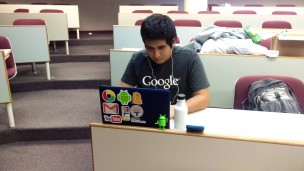The month-old Wesleyan Hackaton club breaks onto the scene with new code and new colleagues.
 Samantha Ong ’18 came to the University thinking that she would enter the pre-medical track as a chemistry major. Because of that, she only took natural science classes during the two semesters of her freshman year. All of that changed, however, over the summer, when Ong enrolled in Professor of Computer Science James Lipton’s Intro to Programming course.
Samantha Ong ’18 came to the University thinking that she would enter the pre-medical track as a chemistry major. Because of that, she only took natural science classes during the two semesters of her freshman year. All of that changed, however, over the summer, when Ong enrolled in Professor of Computer Science James Lipton’s Intro to Programming course.
Ong quickly fell in love with coding. She decided to drop her previous plans of pursuing a degree in chemistry to pursue one in computer science. Soon after, she attended a hackathon in New York City; the experience inspired her to start a club on campus dedicated to coding and attending hackathons across the states.
The Wesleyan Hackathon Club officially began in October of this year. It comprises both computer science majors as well as non-majors; Ong and the Hackathon Club welcome anyone who wants to learn about coding. They meet weekly to talk about upcoming hackathons and practice coding. During their meetings, members work independently on their own projects: The only requirement is that these projects are unrelated to school work. If members want to learn a certain coding language, Ong makes it possible for them to learn that language, although much of the learning is self-guided. The club involves, perhaps appropriately, a good amount of online learning. The internet is the club’s main resource, as it is for many coders, because of its accessibility and its natural alignment with code-intensive projects.
The hackers use the interactive online platform CodeAcademy, where students can code on their own browsers. CodeAcademy is very basic, however, so members supplement it with other courses, such as those offered by the online education website Lynda, which students are able to access through the University.
At hackathons across the country, attendees code nonstop for anywhere between 24 and 48 hours. The goal is usually to build anything from an app to some kind of hardware. Mario See ’18, a member of the club, finds these hackathons useful—and not just because they’ve made him a better coder.
“As a prospective computer science major, I believe hackathons as a great opportunity to gain valuable coding experience, see new places, such as other universities, and meet people with similar interests,” See said.
This past weekend, Nov. 13-15, some members of the club attended HackPrinceton, hosted by Princeton University and sponsored by a variety of big names, including Facebook and Microsoft. The program brings together over 600 students for all across the country.
“Whether you’re making your first mobile app or are ready to jump onboard the most developed hardware track in the country, join us for 36 hours of learning,” the website reads.
Just as See observed, a large component of HackPrinceton was social: The weekend schedule included cupcakes, a yoga workshop, late night pizza, and a team-building session.
At Princeton, students attended an introductory workshop that got them acquainted with web development and building with Bitcoin, a web-based payment method. They also took part in different workshops on hacking with different application programming interfaces (APIs), and listened to presentations by companies focused on the various projects on which they are working, as well as how they are being implemented.
Microsoft gave a rundown of how to use the Cloud as a basis for different projects, Twitter had a session about leveraging the Twitter API—a method that programmers use to make applications, websites, widgets, and other projects—and The Bank of New York Mellon spoke about one of its summer interns, who built a fully-functioning chatbot to automate end-user interactions, a term that refers to the process by which “end-users,” or average laypeople without computer programming training, learn to program computers.
At HackPrinceton, Shirley He ’18 relished the atmosphere of collaboration. Although she and her team were not able to complete a project they’d hoped to finish, she is proud of and excited by the work she and her peers did.
“Being in an environment with such talent and motivation really inspires you, and HackPrinceton did a good job of providing all the resources you need,” He said. “My team and I decided to build a website that would facilitate the process of finding the best time, date, and place to meet with multiple people, and even though we didn’t get it fully functional at the end, the learning experience was really wonderful.”
Meanwhile, at HackHarvardCollege, held the same weekend, Gonçalo Sampaio ’18, although not a member of the Hackathon club, walked away a winner. This winning project, on which Sampaio worked with three other, non-University teammates, monitors vitals with a smart wristband. Named Seisir, this wristband, which is connected to a phone and a machine learning algorithm, is able to detect seizures in real time and immediately contact an ambulance and emergency contacts.
“Our team is now in collaboration with the Microsoft team behind the Microsoft band to evaluate its potential as a health monitor and life saver,” Sampaio wrote in an email to The Argus.
Ong recommends the Hackathon club for students at any level, regardless of their background in computer science. She hopes that the weekly coding sessions will allow members to get started with coding and resources no matter if they’ve never coded before. Ong has high technological hopes for the group moving forward.
“I’m hoping that by the end of the next semester, we will get our website up and running, especially with the help of attending numerous hackathons throughout the year,” Ong said.
-
Anonymous
-
Gonçalo Sampaio
-
Anonymous
-
-